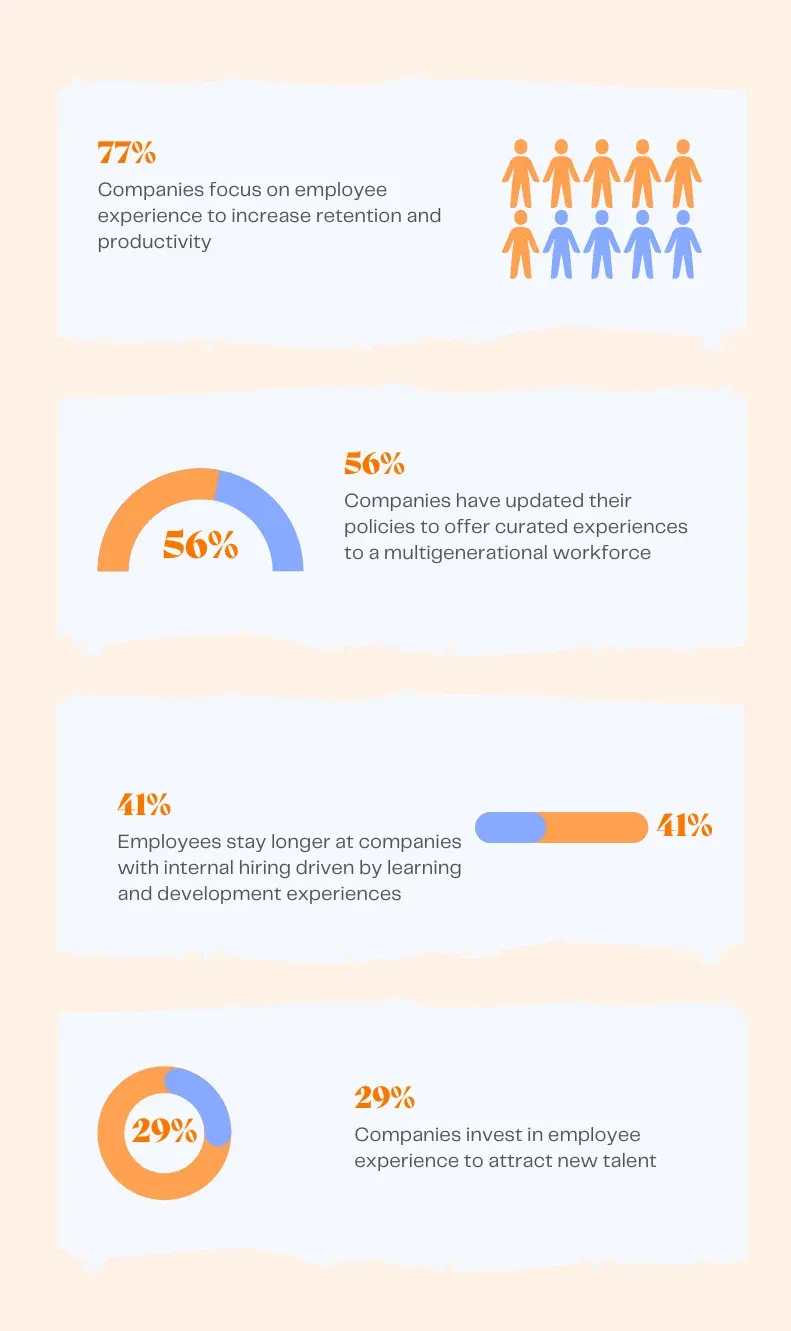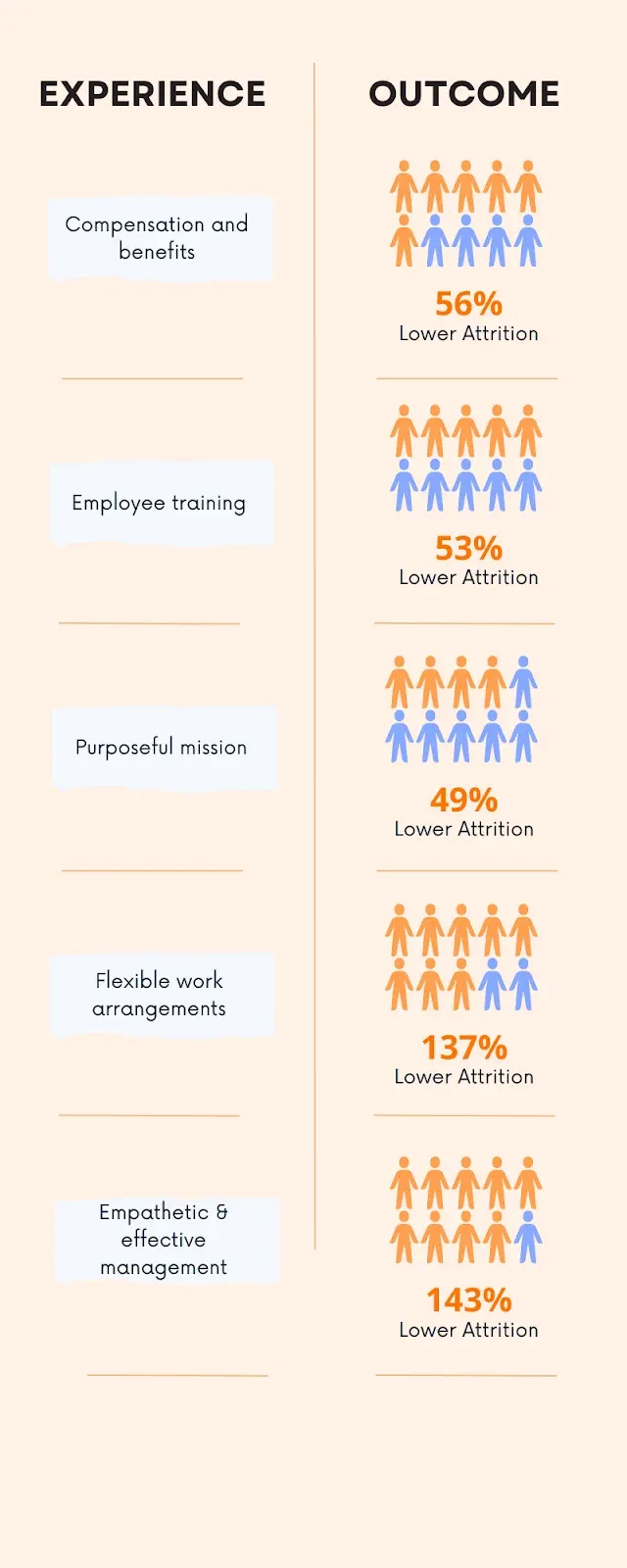¿Por qué es importante la experiencia del empleado y cuáles son sus resultados?
La experiencia del empleado no es sólo una palabra de moda o un término de marketing. Es la clave de su éxito. He aquí 10 razones por las que la experiencia del empleado es importante.
En esta página
- La experiencia del empleado es un imperativo empresarial
- La experiencia del empleado no debe ser como contratar un seguro de coche
- ¿Por qué es importante la experiencia del empleado?
- Cómo dar prioridad a la experiencia de los empleados
- Resultados de la experiencia positiva de los empleados
- Aprovechar Empuls para mejorar la experiencia de los empleados y conseguir un lugar de trabajo próspero
- Hacia un futuro centrado en los empleados
En los últimos años, hemos visto cómo muchas empresas invertían mucho en uno de sus activos más vitales: sus empleados. Desde almuerzos gratuitos a viernes divertidos, pasando por espacios de trabajo relajados, escritorios para trabajar de pie o salas de yoga o meditación, se han multiplicado las iniciativas destinadas a entusiasmar a los empleados y acelerar la productividad. Sin embargo, ¿por qué es importante la experiencia de los empleados más allá de las ventajas?
Pero aquí está el truco: la mayoría de estas empresas se centran en las ventajas y los beneficios. Sólo un puñado de organizaciones dan prioridad a la experiencia del empleado para crear una relación más sólida y significativa con su plantilla. Pero no es por falta de intentos.
La Encuesta de Sentimiento de RRHH 2020 demuestra que la experiencia del empleado es actualmente una de las principales iniciativas para los líderes empresariales (50% de los encuestados).
El problema radica en comprender la importancia de la experiencia del empleado y relacionarla con precisión con los resultados empresariales positivos. En la mayoría de los casos, los empleadores son empleados que no tienen claro qué impulsa las buenas experiencias.
La experiencia del empleado es un imperativo empresarial
El desplazamiento del poder de las organizaciones a los individuos ha hecho que cada vez más empresas se centren en mejorar el viaje que sus empleados realizan con ellos, un viaje denominado la experiencia del empleado.
Como nuevo KPI para medir la retención, la productividad y el rendimiento general, la experiencia de los empleados impulsa el crecimiento empresarial y la captación de nuevos clientes. No se puede subestimar su valor.

Hagámoslo un poco más cercano utilizando la analogía de contratar un seguro de coche.
La experiencia del empleado no debe ser como contratar un seguro de coche
Hagámosle una pregunta sencilla: ¿qué similitud hay entre la experiencia del empleado y la compra de un seguro de coche?
Comprar un coche nuevo conlleva la responsabilidad añadida de contratar un buen seguro de automóvil. Sin embargo, el proceso de adquirir uno puede dejarte estresado y abrumado.
En algún momento, entre resistirse a los argumentos de venta demasiado entusiastas, comparar cientos de pólizas, encontrar la que tiene el precio adecuado (que no le haga un agujero en el bolsillo), leer la letra pequeña (¡no se la salte!) y rellenar un papeleo interminable, el comprador queda agotado de la experiencia de comprar un seguro y le queda poco entusiasmo para disfrutar de su coche recién asegurado.
Del mismo modo, un entorno de trabajo poco propicio, las tecnologías desafiantes, la creciente presión laboral y las relaciones tensas en la oficina pueden hacer que sus empleados se sientan agotados y desinteresados por su trabajo.
Para contrarrestarlo, debe proporcionar a sus empleados la experiencia que les haga comprometerse emocionalmente con su trabajo y sentirse valorados. Trátelos con empatía y serán los mayores defensores de la marca de su empresa.
Forbes recomienda una combinación de elementos físicos (lugar de trabajo), sociales (relaciones) y tecnológicos (herramientas y procesos) para crear una experiencia positiva del empleado. Implica a múltiples partes interesadas alineadas para crear un lugar de trabajo holístico centrado en los empleados como iniciativa empresarial.

¿Por qué es importante la experiencia del empleado?
En pocas palabras, la experiencia del empleado consiste en dar prioridad a las personas. Los empleados son la columna vertebral de una empresa, y sus acciones pueden dictar el ascenso o la caída de una organización.
El tipo de relación que mantienen con los empresarios, la cantidad de esfuerzo que dedicarán al crecimiento de la empresa y el servicio que prestarán a los clientes vienen dictados por la forma en que la empresa prioriza las necesidades de los empleados (si es que lo hace).
1. Atracción y retención del talento
Un entorno de trabajo positivo atrae a los mejores talentos y mantiene el compromiso de los empleados, reduciendo los índices de rotación. Los solicitantes de empleo evalúan las empresas en función de la cultura, las oportunidades de crecimiento y la experiencia en general.
Cuando los empleados se sienten valorados y apoyados, es más probable que se queden, lo que reduce los costes de contratación y formación. No se puede pasar por alto la importancia de la experiencia de los empleados para retener a profesionales cualificados.
2. Crecimiento de los ingresos y rentabilidad para los accionistas
Una estrategia EX bien diseñada impulsa el éxito empresarial al mejorar la productividad, potenciar las interacciones con los clientes y reducir las ineficiencias operativas.
Los empleados comprometidos están más motivados para contribuir, lo que se traduce en mayores ingresos y un mayor valor para los accionistas. Las empresas que invierten en EX suelen ver un impacto directo en la rentabilidad y la sostenibilidad a largo plazo.
3. Cohesión y colaboración
Un lugar de trabajo basado en la confianza y el apoyo fomenta un trabajo en equipo más sólido. Cuando los empleados se sienten escuchados y apreciados, colaboran de forma más eficaz, rompiendo compartimentos e impulsando mejores resultados. Crear un entorno que fomente la comunicación abierta y el trabajo en equipo fortalece tanto las relaciones entre los empleados como la eficiencia general de la empresa.
4. Habilitación y capacitación
Dar a los empleados acceso a las herramientas, recursos y formación adecuados les permite rendir al máximo. Cuando los empleados se sienten capacitados para tomar la iniciativa y tomar decisiones, tienen más confianza en sí mismos y están más comprometidos con sus funciones. Las organizaciones que dan prioridad a EX crean una cultura de confianza y propiedad, lo que conduce a un mayor rendimiento y satisfacción laboral.
5. Compromiso y dedicación al trabajo
Los empleados poco comprometidos son costosos: provocan un mayor absentismo, reducen la productividad y generan una cultura de trabajo negativa. La importancia de la experiencia del empleado radica en su capacidad para fomentar el compromiso y la motivación.
Cuando los empleados se sienten vinculados a su trabajo, aumentan sus niveles de compromiso, lo que se traduce en un mejor rendimiento y una mayor alineación con los objetivos de la empresa. Las organizaciones que dan prioridad a EX observan una mayor lealtad al trabajo y un aumento del esfuerzo discrecional de sus empleados.
6. Creatividad e innovación
La innovación prospera en un entorno en el que los empleados se sienten seguros, animados e inspirados. Un lugar de trabajo que prioriza el bienestar y el desarrollo profesional permite a los empleados pensar de forma creativa y explorar nuevas ideas.
Cuando los empleados se sienten respaldados, asumen riesgos calculados, experimentan y aportan soluciones innovadoras que impulsan el crecimiento empresarial.
7. Defensa de la marca
Los empleados satisfechos se convierten de forma natural en embajadores de la empresa, compartiendo sus experiencias positivas con posibles contrataciones, clientes y compañeros del sector. Una EX sólida refuerza la marca del empleador, mejora la reputación y ayuda a atraer talento de alta calidad. Los empleados que creen en la misión y los valores de la empresa crean un efecto dominó que refuerza la percepción externa de la marca.
La importancia de la experiencia de los empleados va más allá de los RR.HH.: influye en la cultura de la empresa, la rentabilidad y el crecimiento general. Dar prioridad a EX se traduce en una plantilla más comprometida, una mayor colaboración y una base empresarial más sólida. La importancia de la experiencia de los empleados es evidente: cuando los empleados prosperan, las empresas prosperan.
Cómo dar prioridad a la experiencia de los empleados
Aunque los beneficios más comunes de invertir en la experiencia de los empleados incluyen la satisfacción del cliente y la productividad, existen otras razones por las que es esencial y cómo darle prioridad.
Si sus empleados van a trabajar y se van de buen humor, si están entregados a su trabajo y a los clientes, si hay una fricción mínima dentro de los equipos y entre ellos, entonces está en el buen camino hacia una estrategia transformadora de la experiencia del empleado.
Resultados de la experiencia positiva de los empleados
Un reciente informe de LinkedIn mostraba el impacto empresarial de unas buenas estrategias de experiencia del empleado:

Múltiples estudios realizados por Forbes, Gartner y Gallup muestran que, mientras que algunas organizaciones todavía están poniéndose al día en la tendencia de apreciar y motivar a sus empleados, otras, al darse cuenta del valor de una experiencia de empleado de alto ROI, se están situando a un ritmo constante en los primeros puestos de las listas de mejores empleadores, cosechando suculentas recompensas.
Aprovechar Empuls para mejorar la experiencia de los empleados y conseguir un lugar de trabajo próspero

Una buena experiencia del empleado fomenta el compromiso, la productividad y la retención. Los empleados que se sienten valorados y conectados están más comprometidos con su trabajo, lo que se traduce en una moral más fuerte y una menor rotación.
Aquí es donde Empuls marca la diferencia. Al integrar reconocimiento, recompensas, feedback y colaboración, Empuls ayuda a las empresas a crear una cultura en la que los empleados prosperan.
Reconocimiento significativo: Celebre los logros con recompensas personalizadas y el reconocimiento de los compañeros.
✅ Comentarios de los empleados en tiempo real: Recopile información a través de encuestas para abordar las preocupaciones de forma proactiva.
✅ Conexiones de equipo más fuertes: Fomente el compromiso con una intranet social para una comunicación fluida.
✅ Incentivos personalizados: Ofrezca ventajas de bienestar, beneficios libres de impuestos y descuentos exclusivos.
✅ Compromiso automatizado: Mantenga motivados a los empleados con programas de reconocimiento estructurados.
La experiencia de los empleados impulsa el éxito. Con Empulslas organizaciones pueden crear un lugar de trabajo en el que los empleados se sientan valorados, apoyados e inspirados.
Cree un lugar de trabajo donde los empleados se sientan valorados, comprometidos y motivados. Empuls le ayuda a impulsar el reconocimiento, las recompensas y las conexiones significativas, todo en una sola plataforma.
Hacia un futuro centrado en los empleados
Para operar en un entorno empresarial moderno y competitivo basado en el valor de la marca, el crecimiento sostenible, la retención del talento y la productividad, las empresas deben cultivar un conocimiento más profundo de sus empleados y, al mismo tiempo, mejorar continuamente su experiencia a partir de comentarios periódicos.
El camino a seguir consiste en construir un marco de experiencia integrado en el que los empleados sean tratados con empatía, valorados, cuidados y a los que se inculque un sentido de propósito mientras trabajan en un entorno inclusivo y sostenible.
"EX no son sólo eventos divertidos. Es hacer que la gente se sienta segura y feliz para que pueda rendir al máximo." - Wassim Eid, CHRO, Chalhoub













